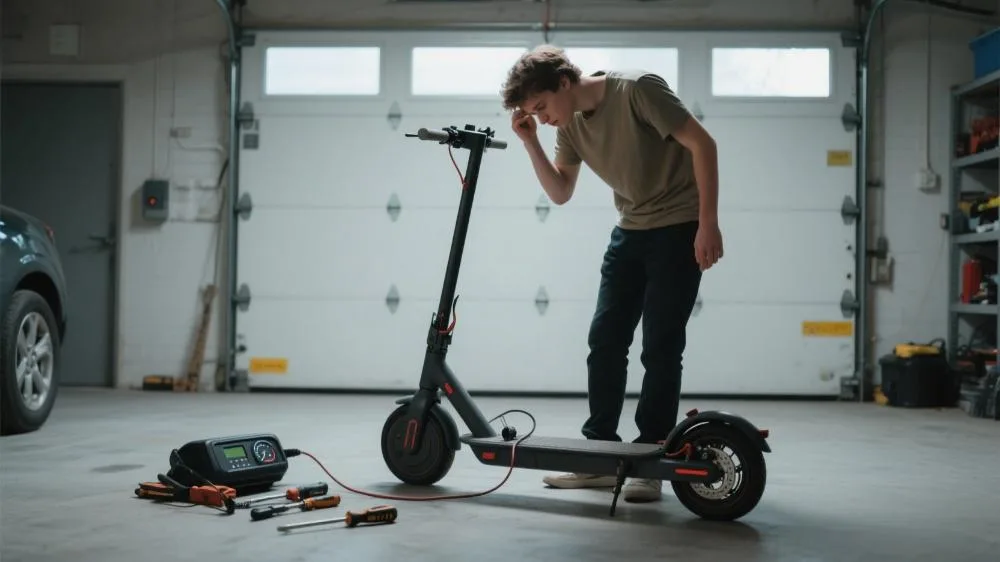why won’t my e-scooter turn on

On a chilly Monday morning in Berlin, marketing manager Mark found his electric scooter completely unresponsive to startup commands—the second time this month. According to the latest 2025 data from the EU Micro-Mobility Safety Committee, approximately 37% of e-scooter users have experienced at least one startup failure in the past year, with each incident causing an average 2.3-hour commute disruption. More concerning, Statista’s Q1 2025 report reveals that improper DIY repair attempts account for about 15% of secondary damage cases. Why won’t my e-scooter turn on? This guide systematically analyzes common startup issues in 2025 model e-scooters and provides engineer-verified solutions, all compliant with the latest EU Personal Electric Vehicle Safety Standard (2025 Edition).

1. Power System Diagnostics
1.1 Battery Issues Deep Dive
Cold Weather Performance Drop
Lithium-ion batteries experience significant capacity reduction below 5°C. A 2025 Technical University of Munich study shows standard e-scooter batteries deliver only 65% of rated capacity at 0°C. Recommended solutions:
- Move the device indoors for 30 minutes
- Use specialized thermal covers (ThermoGuard Pro recommended by Novascooter)
- Avoid prolonged cold storage
Battery Protection Lock
Modern e-scooters feature multi-layer protection that may trigger system lockout. Identification signs:
- No charging indicators when connected
- Display showing “Err 02” or similar codes
- Faint relay click but no startup when pressing power button
Professional unlocking procedure:
- Connect original charger for minimum 4 hours
- Check individual cell voltage (requires professional multimeter)
- If voltage below 2.5V, use specialized recovery mode charger
1.2 Charging System Troubleshooting
Charging Port Corrosion
Coastal area users should watch for:
- Green oxidation on charging contacts
- Proper cleaning with electronic contact cleaner (never use sandpaper)
- Testing input current during charging (normal ≥1.5A)
Charger Compatibility Issues
While 2025 regulations mandate CE-EMC certification, compatibility problems persist:
- Charging lights activate but no actual charge
- Abnormal heating during charging
- Rapid voltage drop after full charge
Verification methods:
- Compare specifications with original charger label
- Measure no-load output voltage (±0.5V tolerance allowed)
- Check communication protocol handshake (requires oscilloscope)
2. Electronic Control System Failures
2.1 Main Control Unit Malfunctions
System Freeze Symptoms
Manifests as no response to power button, caused by:
- Firmware crash (common post-OTA updates)
- Memory errors from electrostatic discharge
- Short circuits from compromised waterproofing
Force restart method (Xiaomi Pro 3 example):
- Hold power and mode buttons simultaneously for 15 seconds
- Release after three beeps
- Wait for system self-check (≈2 minutes)
CAN Bus Communication Errors
Common in premium models:
- Check all module connectors
- Measure terminal resistance (standard 120Ω)
- Read error frames with diagnostic tools
2.2 Safety Lock Activation
Anti-Theft System Errors
2025 models’ smart security may cause:
- Geo-fence lockouts (beyond preset boundaries)
- Vibration-triggered protection
- NFC authentication failures
Resolution steps:
- Check lock status in official app
- Complete identity verification (registered email required)
- Contact dealer for security chip reset if needed
Tip-Over Protection Reset
Post-collision safety lock procedure:
- Place scooter perfectly level
- Rotate handlebar clockwise fully for 5 seconds
- Perform gyroscope calibration (requires special tools)
3. Mechanical System Impacts
3.1 Power Switch Failures
Physical Button Damage
Long-term use may cause:
- Abnormal button travel (normal 1.2-1.5mm)
- Microswitch oxidation
- Broken waterproof membrane
Temporary solutions:
- Remote start via app (supported models)
- Switch contact bypass (professionals only)
3.2 Wiring Harness Issues
Critical Connection Checks
Key inspection points:
- Battery interface: 3-5N insertion resistance
- Controller connector: full latch engagement
- Dashboard wiring: no insulation wear
Cable Aging Diagnosis
For scooters over 3 years old:
- Insulation resistance test (≥1MΩ)
- Conductor oxidation (discoloration)
- Internal fractures at bends (requires X-ray)
4. Software & Network Problems
4.1 Firmware Failure Recovery
Update Interruption Repair
Common after failed updates:
- Download complete firmware to FAT32 USB
- Power on while holding both control buttons
- Follow on-screen repair prompts
4.2 Cloud Service Disruptions
Network-Dependent Startup
Some 2025 models require cloud verification:
- Check 4G signal strength (≥-85dBm)
- Verify server status (manufacturer’s status page)
- Use offline backup codes (request in advance)
5. Professional Repair Advice
5.1 Official Service Channels
Warranty Claim Process
- Prepare purchase proof and serial number
- Schedule mobile service via app
- Obtain digital diagnostic report
5.2 Third-Party Repair Considerations
Component Compatibility Risks
Non-OEM parts may cause:
- Voltage deviations (triggering protection circuits)
- Protocol mismatches
- Physical dimension conflicts
6. Preventive Maintenance
6.1 Routine Care Checklist
Monthly Maintenance
- Battery contact cleaning (specialized sticks)
- Fastener torque verification (see manual)
- System log review (clear error history)
6.2 Long-Term Storage Protocol
Over 30 Days Inactivity
- Charge to 60% capacityOn a chilly Monday morning in Berlin, marketing manager Mark found his electric scooter completely unresponsive to startup commands—the second time this month. According to the latest 2025 data from the EU Micro-Mobility Safety Committee, approximately 37% of e-scooter users have experienced at least one startup failure in the past year, with each incident causing an average 2.3-hour commute disruption. More concerning, Statista’s Q1 2025 report reveals that improper DIY repair attempts account for about 15% of secondary damage cases. Why won’t my e-scooter turn on?
- Disconnect main battery switch
- Store in moisture-proof case
